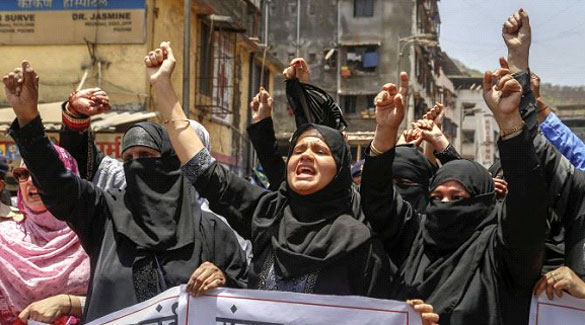Muslim Women’s Right To Unilateral Divorce Given In Quran Restored By Kerala High Court After Five Decades

By Arman Neyazi, New Age Islam
15 April 2021
Overruling A Nearly Five-Decade Judgment, The Kerala High
Court Has Restored The Rights Of Muslim Women For Unilateral Divorce Without
Resorting To Judicial Proceedings. It Has Recognised That Islamic Shariat Allows
Gender Equality And Allows Women Too, Like Men, To Practice Extrajudicial
Divorce.
Important
Points:
1. Divorce by Men or Khula by Women –
Holy Quran Advocates Equality. Quran recognises the right to divorce of women.
2. Islam provides women several
instruments for getting away from an intolerable marital relationship
unilaterally, without resorting to judicial intervention:
a) Talaq-e-Tafweez allows to dissolve the
marriage if husband fails to keep his end of the contract;
b) Khula
lets the woman unilaterally divorce her husband by returning his dower;
c) Mubara’at allows dissolution of
marriage by mutual consent;
d) Faskh allows dissolution by
intervention of a Qazi.
e) Lian, If a husband charges her wife
with adultery and cannot produce any evidence, the wife is entitled to obtain a
divorce.
f) Khyar-ul-Bulugh, If an innocent girl
child has been given in marriage, she can cancel the marriage when she reaches
her age of puberty.
------

IMAGE: Kindly note that this image has
been posted for representational purposes only. Photograph: PTI Photo.
--------
Noting that the Holy Quran recognises the
right to divorce equally for both men and women, the Kerala High Court bench
observed that the dilemma of Muslim women, particularly in the State of Kerala,
came to the fore when the single bench in the 'K C Moyin versus Nafeesa and
Others' case negated the right of Muslim women to invoke extra-judicial divorce
in the light of the Dissolution of Muslim Marriages Act, 1939 in a judgement in
1972. The single bench then had held that under no circumstances, a Muslim
marriage can be dissolved at the instance of the wife, except in accordance
with the provisions of the Act. In its judgment given yesterday (April 14,
2021), the division bench of Justices A Muhamed Mustaque and C S Dias analysed
four major forms of dissolution of marriages as recognised under Islamic Law
and protected under the Shariat Act at the instance of the wife.
According to a Press Trust of India report
‘Muslim women have right to invoke extra-judicial divorce, rules Kerala HC as
it overturns 1972 judgment’ which declares that the bench comprising Justices A
Muhamed Mustaque and C S Dias found that under the Shariat Act Muslim wives
have been given the privilege of dissolving their marriages according to their
will. The bench observed that there are four different ways by which a marriage
can be annulled on the demand of a wife.
According to this report, it was noted by
the court that the Holy Quran, which means Allah, the Almighty, recognises
women’s right to divorce unilaterally without invoking court proceedings, on an
equal footing as do men.
Some of us Muslims do not acknowledge the
right to gender equality mentioned in the Quran and spread misinformation that
Islam differentiates between the rights of the two sexes. This has happened
because soon after the demise of the Prophet, Arab customs and patriarchy
prevalent in other parts of the world where Islam spread, asserted itself
overwhelming Quran’s rulings and a clear guidance on gender equality and
justice. Even today, Islamic courts in Saudi Arabia and other Muslim countries
differentiate between the rights of men and women, particularly in the matter
of unilateral divorce and behave most abominably towards young nine or
ten-year-old girls, forcing them to live with their elderly husbands.
As far as equality between husband and
wife, or men and women in general is concerned, there is absolutely no
difference between them in Islam. Both of them are promised the same reward and
the same punishment for their conduct. The Holy Quran says:
And for women are rights over men similar to those of
men over women. (2:226)
While talking about equal rights of men and
women, Islam does not distinguish between genders and always mentions human
being, or mankind, in the Holy Quran. In the famous Surah al-Baqarah verse 30,
Allah the Almighty says to the angels that He is sending on the earth His
representatives. Allah does not distinguish between men or women when He is
saying of sending His representatives on the earth. This is the value granted
by Allah to all humankind.
The Holy Quran says:
وَاِذۡ قَالَ رَبُّكَ لِلۡمَلٰٓـئِكَةِ
اِنِّىۡ جَاعِلٌ فِى الۡاَرۡضِ خَلِيۡفَةً
Behold, thy Lord said to the angels: "I will
create a vicegerent on earth. (Surah Al-Baqarah
2:30) - Yusuf Ali
Can there be any doubt that humankind
means, both men and women? There is no question of the superiority of one
gender over the other, as Prophet Muhammad (SAW) has said in his last sermon.
In the eyes of Islam, all are equal, there is no question of one gender being superior
to another. Men and women have different responsibilities to perform on this
earth, but they have equal rights, even if they have different duties and
different roles to perform.
Islamic history is full of real historical
events which depict women as businesswomen, statesmen and warriors who fought
along with men on the battlefields. Islam has given equal rights to women in
unilaterally taking or giving divorce to their spouse.
Muslim wives can resort to following ways
of divorces:
Talq-e-Tafweez
Under this system of divorce, the husband
vests in his wife the right to divorce.
Mubara’at
An irrevocable divorce by mutual consent.
Faskh
In this system of divorce, a wife can apply
for divorce in the court of a Qazi and get her marriage annulled.
Lian
If a husband charges her wife with adultery
and cannot produce any evidence, the wife is entitled to obtain a divorce. This
is called Lian
Khyar-ul-Bulugh
If an innocent girl child has been given in
marriage, she can cancel the marriage when she reaches her age of puberty.
All the above-mentioned ways of divorce are
for the women to come out of a marriage if and when she so wishes.
Khula,
The Woman’s Inalienable Right to Divorce
As a husband has the rights of dissolving a
marriage, a wife also can get a divorce under the Islamic way of a divorce,
called ‘Khula’. To get a divorce under ‘Khula’ a wife is not needed to submit
any proof of harassment or ill-treatment on the part of her husband. A wife can
just mention that she does not like the face of her husband as a reason of
divorce.
Khula is another way of Islamic divorce,
the power of which has been invested into the wife. The wife can take divorce
from her husband after returning all the gifts and mehr she has received from
her husband. This can be settled in the court of a Qazi. According to Islamic
traditional Fiqh, Khula allows a woman to initiate the process of a divorce.
Khula has got a mention in the Quran in Surah
Al-Baqarah 2:229, and in Surah
An-Nisa - 4:127.
There is a famous narration of Ibn 'Abbas
in connection with a Khula divorce as follows:
The wife of
Thabit bin Qais came to the Prophet ﷺ and said, "O Allah's
Apostle! I do not blame Thabit for defects in his character or his religion,
but I, being a Muslim, dislike to behave in an un-Islamic manner (if I remain
with him)." On that Allah's Apostle ﷺ said (to her),
"Will you give back the garden which your husband has given you (as
Mahr)?" She said, "Yes." Then the Prophet ﷺ
said to Thabit, "O Thabit! Accept your garden, and divorce her once."
(Bukhari #63, Hadith #197)
In Islam women’s right is absolute. These
have to be understood and rightly used in empowering them in society. Muslim
women empowerment will be empowerment for society. They are a part and parcel
of our everyday life. They should enjoy the confidence of the Islamic society
as they enjoy the confidence of Islam. We, Muslims must give them their due in
every institution of the society. We must always keep in mind that Islam
advocates equality of mankind in every possible way.
And
Allah knows the best.
------
Arman
Neyazi is a columnist with NewAgeIslam.com
URL: https://www.newageislam.com/islamic-sharia-laws/muslim-divorce-quran-high-court/d/124699
New Age Islam, Islam Online, Islamic Website, African Muslim News, Arab World News, South Asia News, Indian Muslim News, World Muslim News, Women in Islam, Islamic Feminism, Arab Women, Women In Arab, Islamophobia in America, Muslim Women in West, Islam Women and Feminism
